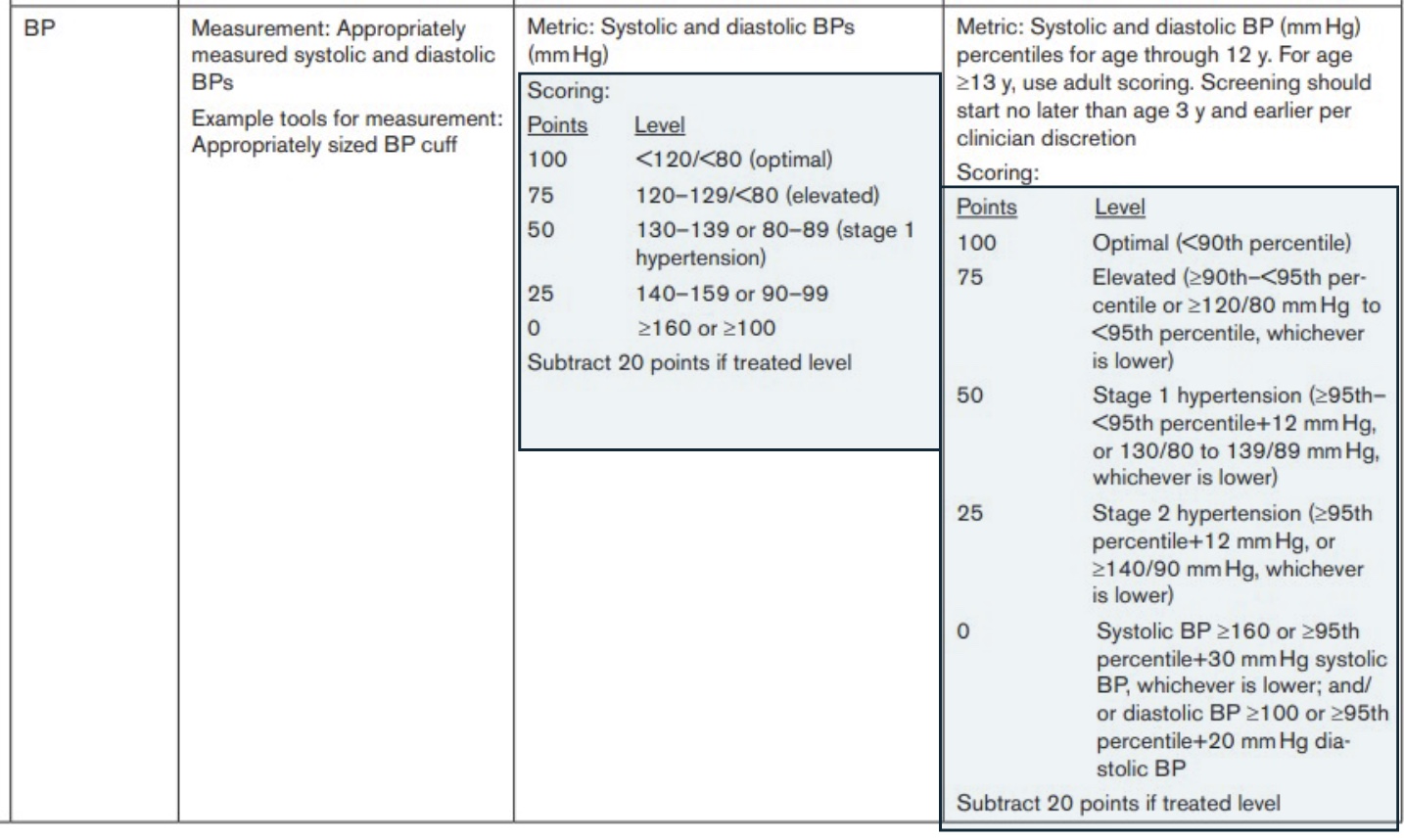Assessment of Risk
1/22
There's no tags or description
Looks like no tags are added yet.
Name | Mastery | Learn | Test | Matching | Spaced | Call with Kai |
|---|
No analytics yet
Send a link to your students to track their progress
23 Terms
Introduction
-Pre-participation screening recommendations emphasize the public health message of physical activity for ALL individuals
-Identify those who are at risk for adverse exercise-related cardiovascular (CV) events and which individuals should be referred for medical clearance
-Acknowledge that vigorous exercise is associated with a small but measurable acute risk of activity-associated sudden cardiac death (SCD) and Acute Myocardial Infarction (AMI).
•Those with with underlying CVD who perform unaccustomed vigorous PA are at highest risk (ex: shoveling snow)
-Intended to reduce or remove barriers to adopting and maintaining habitual PA or exercise
*Self-guided and formal assessments; Once asses risk, than can optimize exercise Rx
Graphs: Sudden Cardiac Death (SCD) and Acute Myocardial Infarction (AMI)
Graph 1
-<5= SIDS, preliminary arythrmias, etc.
-5-25: low risk, any occurrence likely bc of high level competition; congenital disease
-35 and up: acquired disease=from poor lifestyle
*Males >45 and Females >55= high risk SCD and MI (based on age/lifestyle choices)
Graph 2
-5-10% and 7-15%: with coronary artery disease
-<20%: acute MI; unstable AP
*~40% die bc of AMI or coronary vascular disease
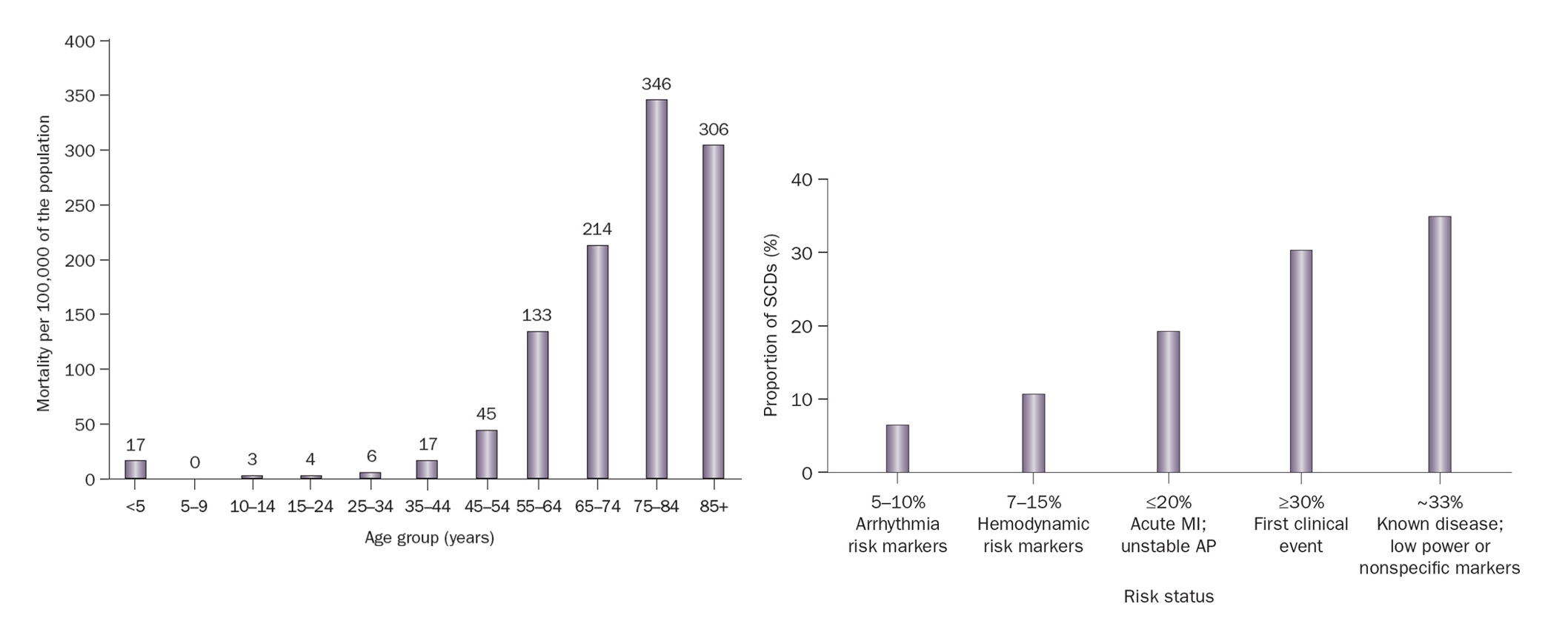
How to protect ourselves as clinicians/coaches
-Recommended Sequence of Evaluation prior to engaging in physical activity or structured exercise programs
•Informed consent process (ex: lab)
•Exercise pre-participation health screening (ask patient to tell us much history as can)
•Health history
•Cardiovascular (CV) risk factor analysis
*ask follow up questions
*HD #1 leader death in the U.S.
Informed Consent (+ Consent vs. Assent)
-Important ethical and legal consideration and should be completed prior to
(a) the collection of any personal and confidential information, (ex: HIPPA)
(b) any form of fitness testing, or
(c) exercise participation
-Ensure that individuals know and understand the purpose(s) and risk(s) associated with screening, assessment, and the exercise programing.
-Verbally described with the individual given every chance to ask questions before signing.
-Must indicate the participant is free to withdraw at any time. (patient can deny)
-Consent vs. Assent
Consent: if not of age, so parents consent for child
Assent: child can give verbal consent even if can’t sign; also if older and can’t sign (w/ guidance of adult/person in charge of their care)
-Signing consent forms means both the patient and investigater agree to follow the rules (so no protection if go outside scope of practice)
Pre-participation Health Screening (goals)
*dif than consent; are they safe to exercise?
-Goals are to identify individuals:
(a) who should receive medical clearance before initiating a moderate to vigorous intensity exercise program or increasing intensity of current program.
*mild=ADL=don’t need medical clearence
(b) with clinically significant disease(s) who may benefit from participating in a medically supervised exercise program
(c) with medical conditions that may require exclusion from exercise programs until those conditions are abated or better controlled
Pre-participation Health Screening (process)
2 stages…
a) The need for medical clearance before initiating or progressing exercise programming is determined using a screening algorithm (ACSM, Live’s 8).
Self-guided screenings can be an acceptable substitute for this method. ex: YMCA
b) If indicated during screening, medical clearance should be sought from an appropriate health care provider.
1: The manner of clearance should be determined by the clinical judgment and discretion of the health care provider.
2: Understand your scope of practice.
ACSM Pre-participation Screening Algorithm (overview)
-Designed to identify individuals at risk for CV complications during or immediately after aerobic exercise
•Current evidence is insufficient regarding CV complications during resistance training to warrant formal prescreening recommendations
*short
ACSM Pre-participation Screening Algorithm (components)
a) Classifying individuals who do (Yes) or do not (No) currently participate in regular PA
Yes: prob better know symptoms
No: might not know if have symptoms
b) Identifying individuals with known CV, metabolic, or renal diseases or those with signs or symptoms suggestive of cardiac, peripheral vascular, or cerebrovascular disease, Types 1 and 2 diabetes mellitus (DM), and renal disease
c) Identifying desired exercise intensity or goal
*ex: play w/ grandkids=moderate; marathon=vigorous
For Test Know…
-Exercise reversed non-exerciser (who likely needs medical clearance)
-Signs and Symptoms…
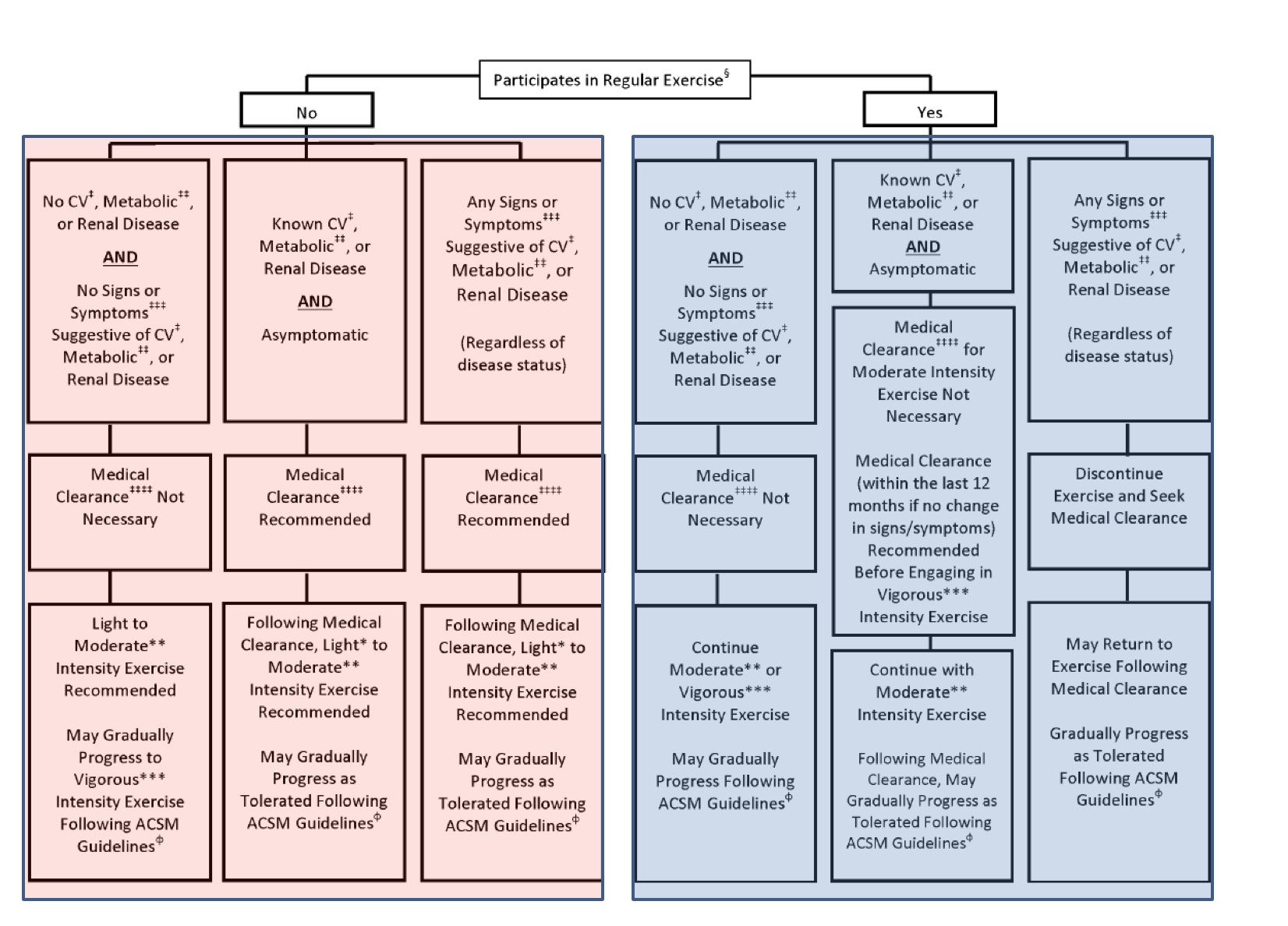
ACSM Pre-participation Screening Algorithm (signs and symptoms)
-Chest pain
-Shortness of breath at rest or with mild exertion (things use to be able to do and can’t do anymore)
-Dizziness or syncope (passed out)
-Orthopnea or paroxysmal nocturnal dyspnea (sleep apneia, short breath doing nothing/at rest)
-Ankle edema (aka ankle swelling, early sign of heart failure; NOT if from ankle sprain/injury)
-palpations or tachycardia (racing heart; natural or not?)
-intermittent claudication (clots, numbness or tingling that is not normal)
-known heart murmur (might be blockage)
-Unusual fatigue or shortness of breathe with usual activities
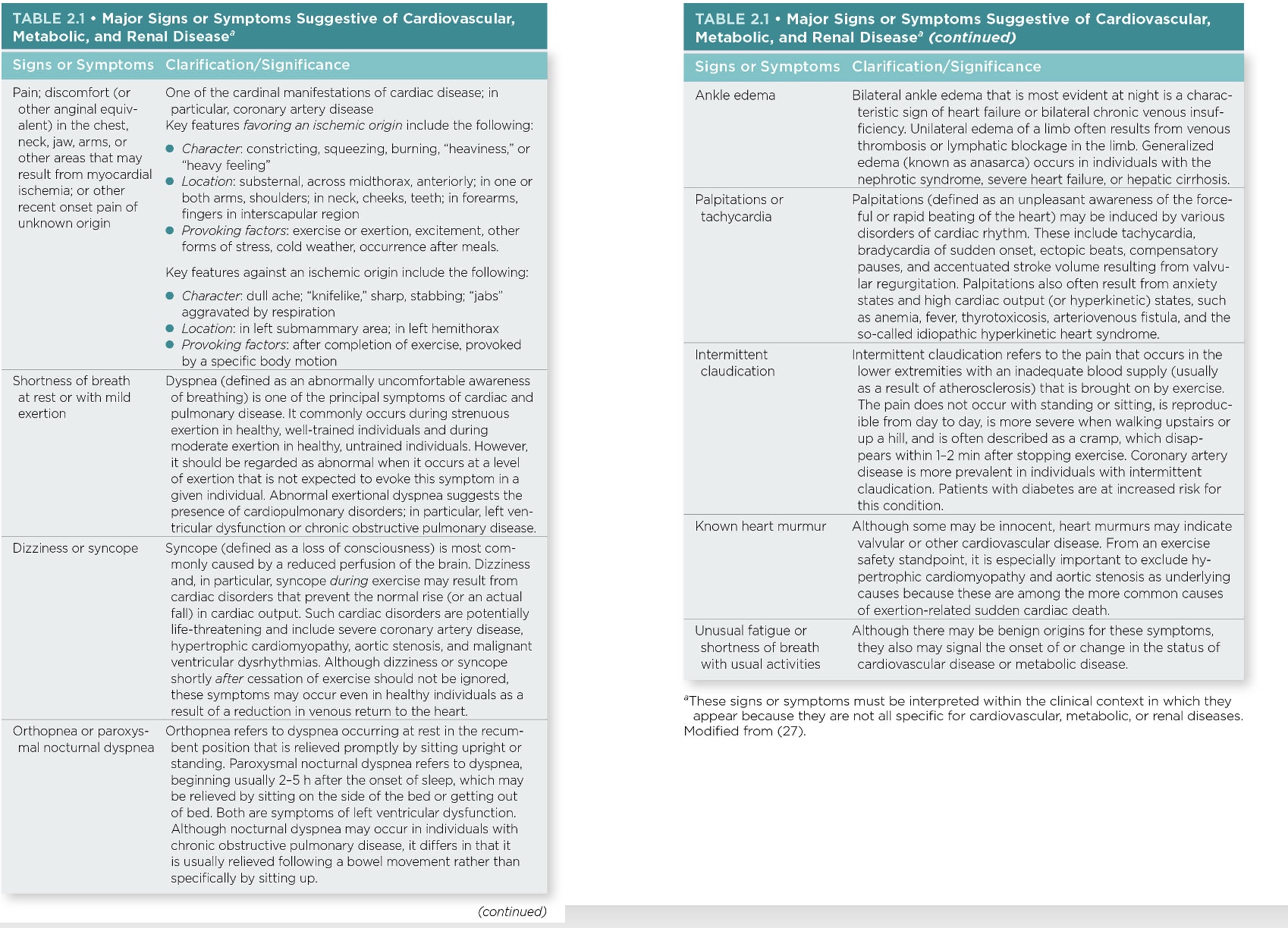
ACSM Pre-participation Screening Algorithm (steps)
-Step 1: if any yes, need medical clearance. Go to step 2 if don’t say any yes
-If yes to PA step 2, go to step 3
-If all good step 3, no medical clearance needed.
*Any not good=medical clearance
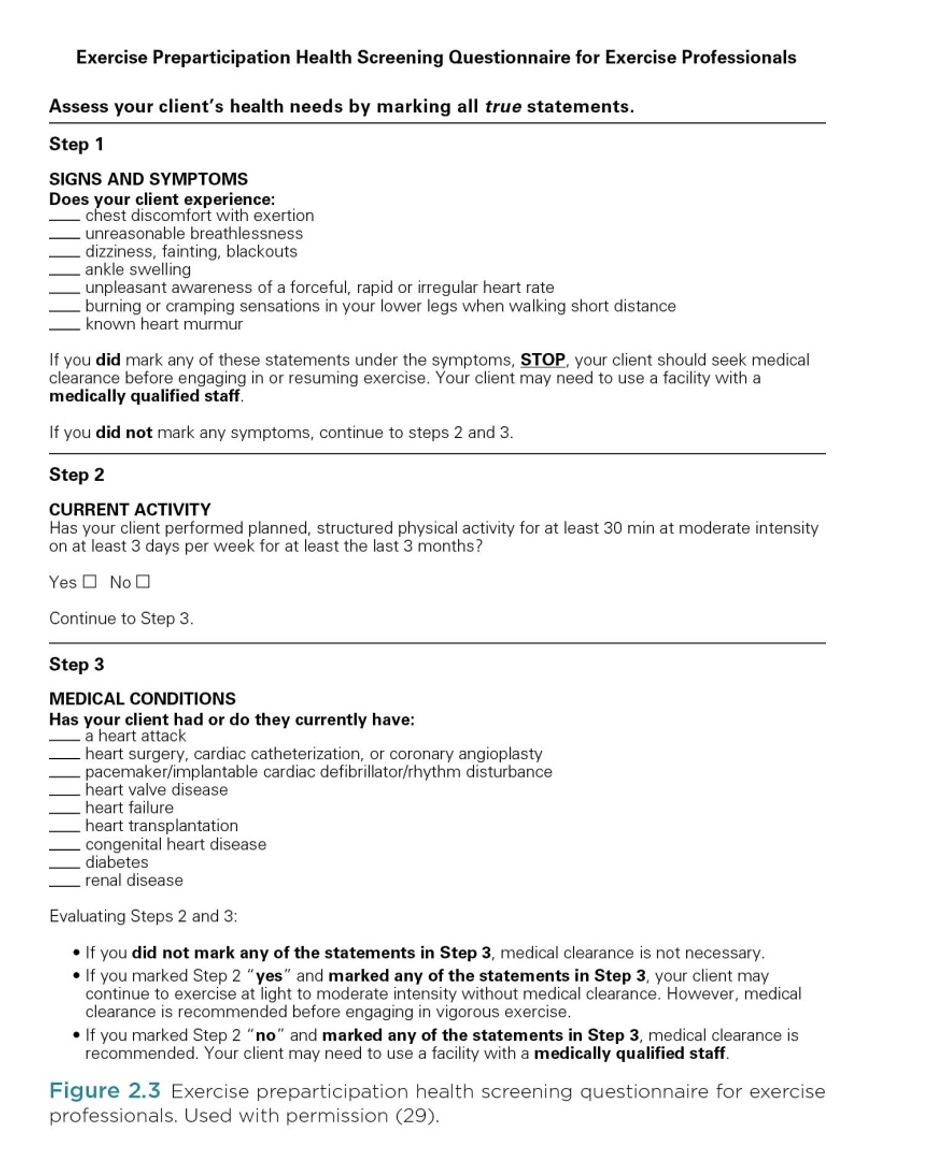
ACSM Pre-participation Screening Algorithm (follow-up questions)
-Pertinent follow-up questions may include:
•What were you doing during these periods?
•Were you more breathless than you would have expected for this activity?
•Compared to recent similar activities, were you more fatigued following the activity?
Self-Guided Methods
-In the absence of a qualified exercise or health care professional
-Preparticipation health screening by self-reported medical history or health risk appraisal
-PAR-Q (7Q)
PAR-Q
“PA Readiness Questionar”
-Page 1: 7 most important questions. If all no=done with survey. Be careful patients saying “no disease but take medication”. If yes to any, need page 2 and 3
-If all no page 2 and 3: cleared for exercise: If any yes on page 2 and 3: need medical clearance
-Signing= where protected, even if patient was dishonest
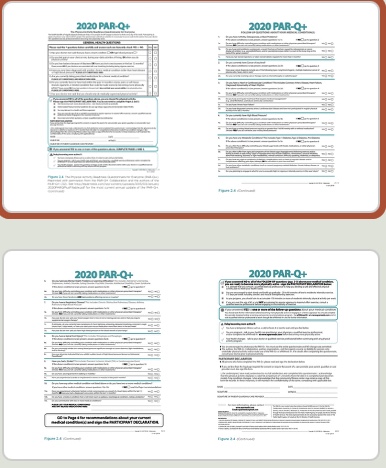
Risk-Straritiation for Individuals in Cardiac Rehab and Medical Fitness Facilities
-More in-depth risk stratification procedures for individuals with known CVD in exercise-based cardiac rehab and medical fitness settings
*8 dif markers + Life Essential 8
ACSM CVD Risk Factor Assessment
*+=+ for CVD, increased chance SD, etc., check 1 pt; negative= less likely
*ANY medications=have disease!
*8
Positive
-Age: Men >45; Women>55
*estrogen and pre-menopause protect women before 55, afterwards have equal or exceed men
-Family History: MI, coronary revacularization, or sudden death before 55yr in father or other male first-degree relative OR 65yr moth or other female first-degree relative
*SD not always CVD
-Cigarette Smoking: current, OR those who quit within the previous 6 mo OR exposure to envionrmental tobacoo
-Physical Inactivity: Not meeting 75-150 min/wk mod to vig
-BMI/Waist Girth: >30
-BP: 130/80 (and/or)
-Lipids: LDL=>130; HDL=<40
-BG: >100
Negative
-HDL: >60
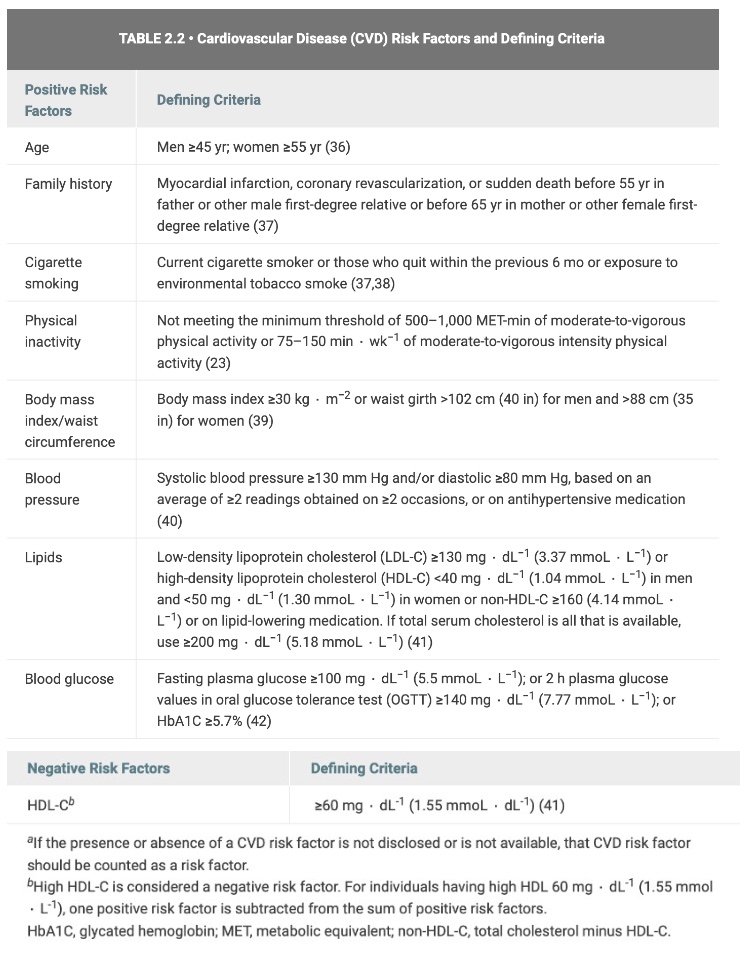
of the ACSM CVD risk factor assessment, which factors can be helped by exercise?
-BMI, BP, BG, lipids…
*Lipids: LDL not modified, BUT HDL highly modifiable
*Statins: decrease LDL, keep HDL positive side
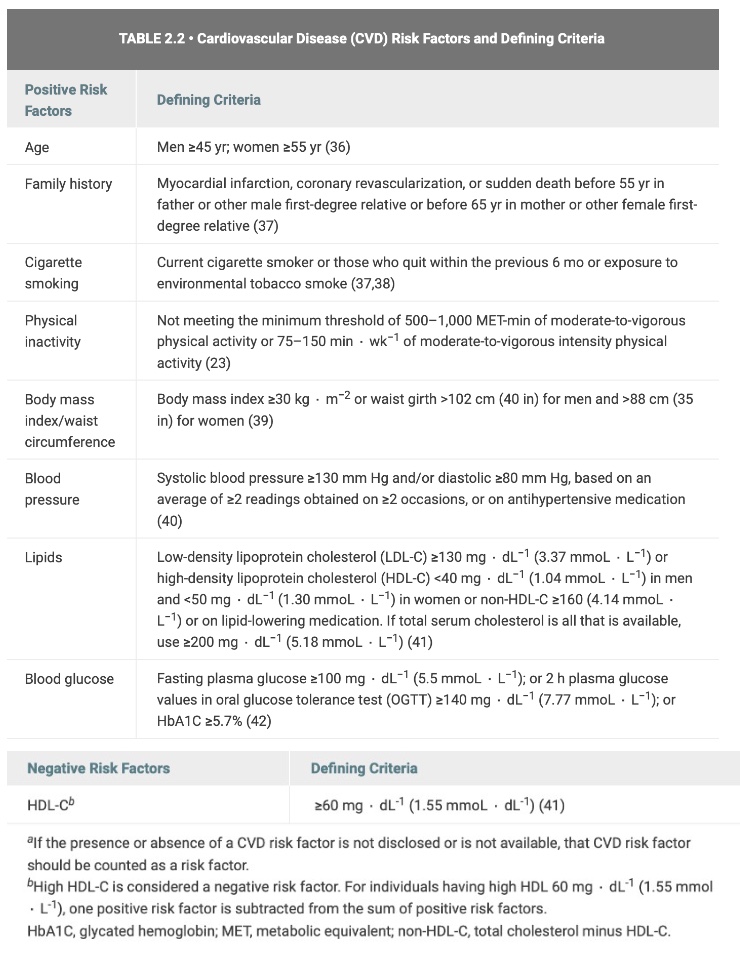
Life’s Essential 8: Overview
-Gives overall CV health
-score 0-100, average=overall CV health
-8 categories
-Green=little risk; Yellow=lifestyle modification; Red=intervention
-Bias: diet recall, honesty of patient
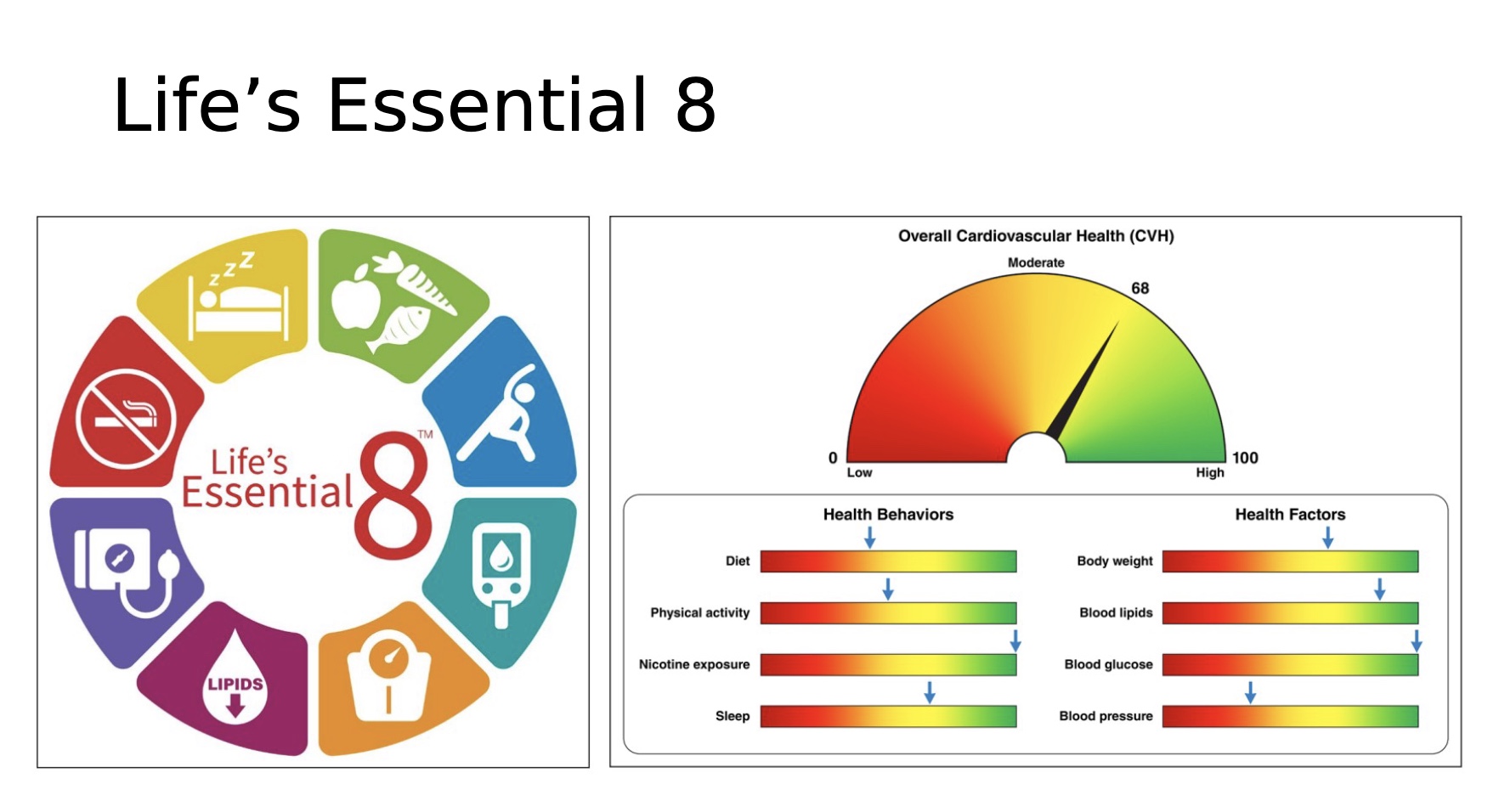
Life’s Essential 8: Diet
-ACSM=adults, 8=separate category for kids
-DASH and Mediterranean Diet:
DASH=diet high in nutrients and low in salt
*don’t memorize percentiles
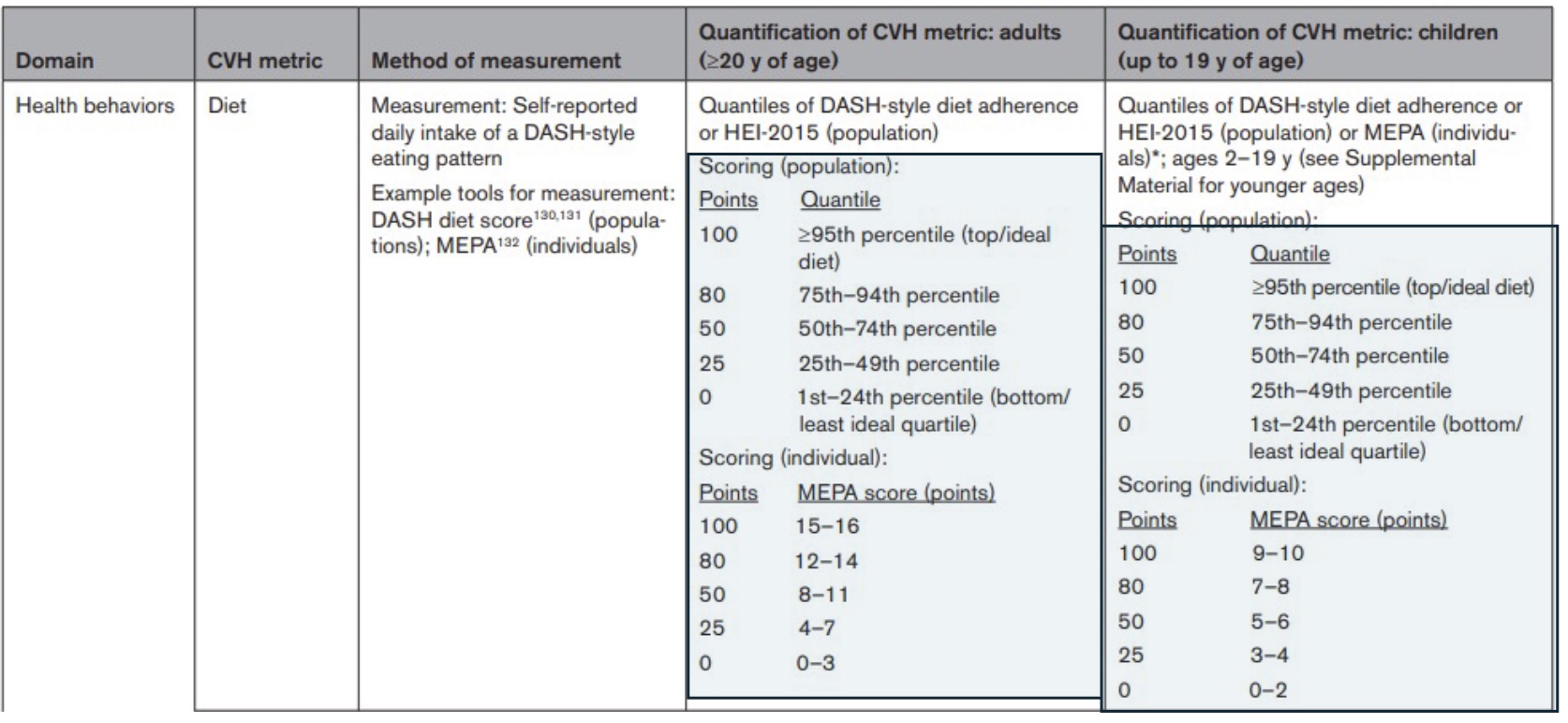
Life’s Essential 8: PA and Nicotine
*PA: kids more minutes bc recommended 60 min/day
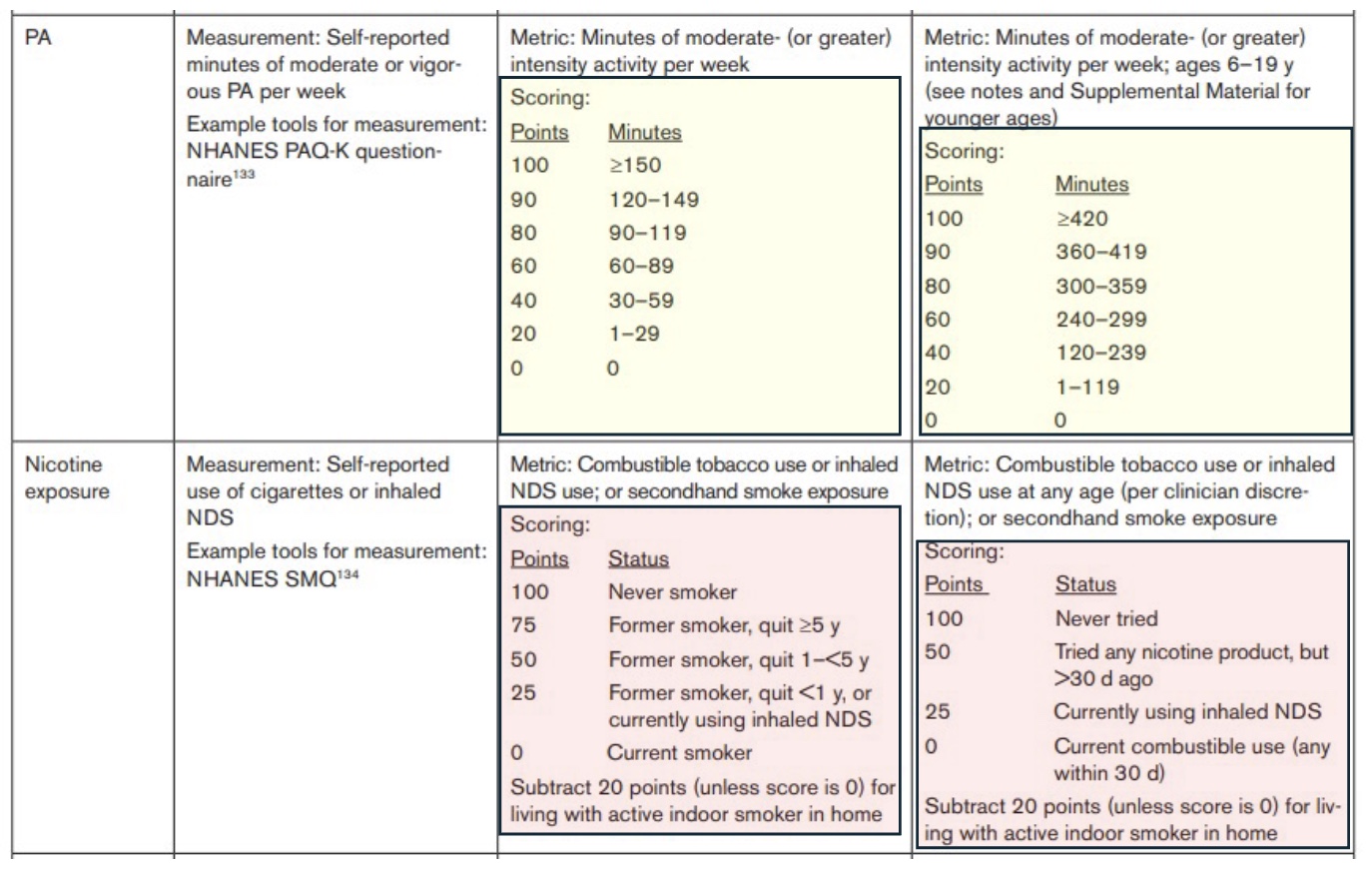
Life’s Essential 8: Sleep Health
*unique (not even in ACSM)
*No age or family history, just lifestyle

Life’s Essential 8: BMI and Blood Lipids
-Blood lipids= “non HDL”= just LDL
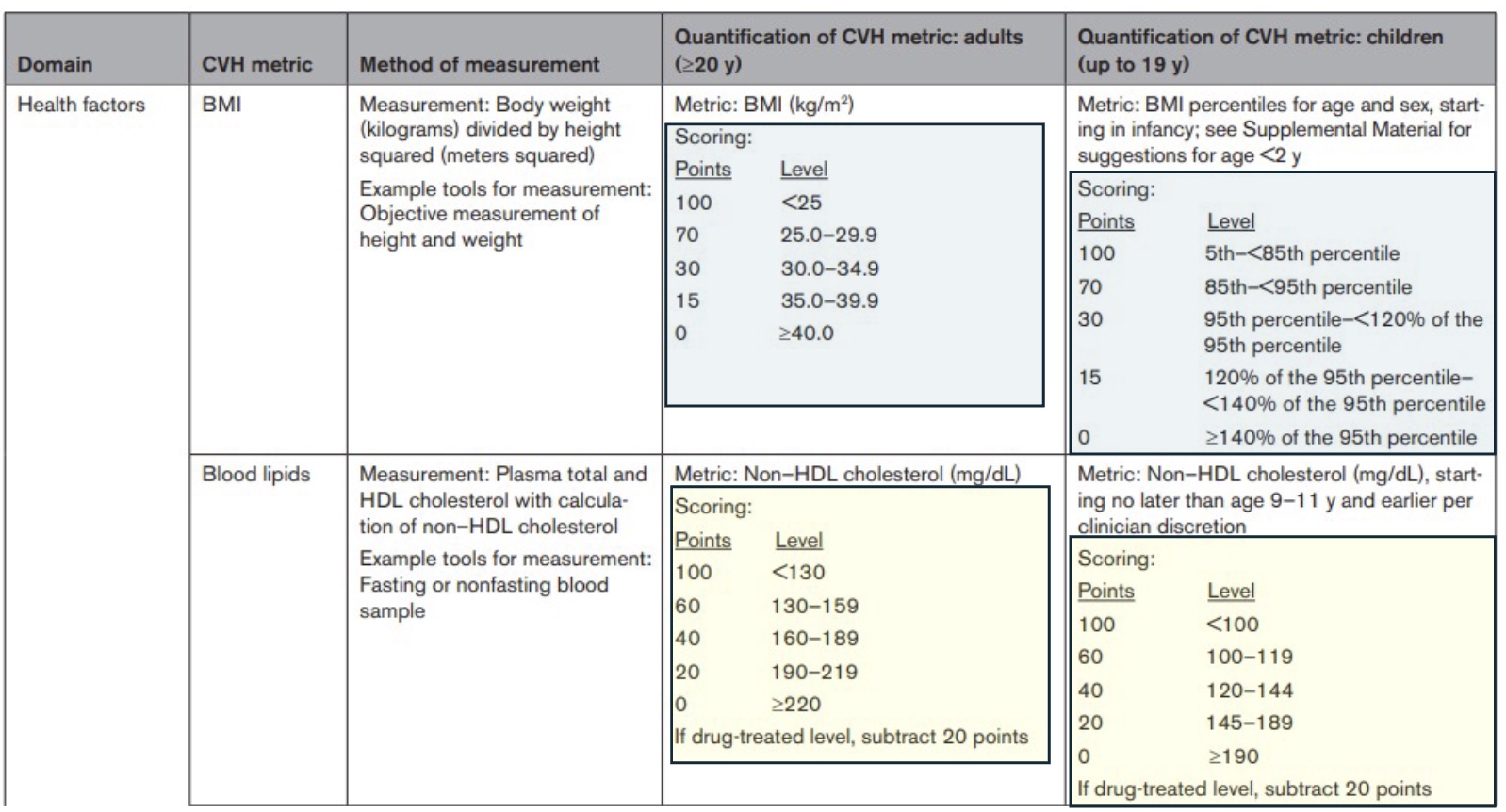
Life’s Essential 8: Blood Glucose
-HbA1c: concentrated Hb, BG control over a period of time (not just at 1 moment like w/ finger prick)
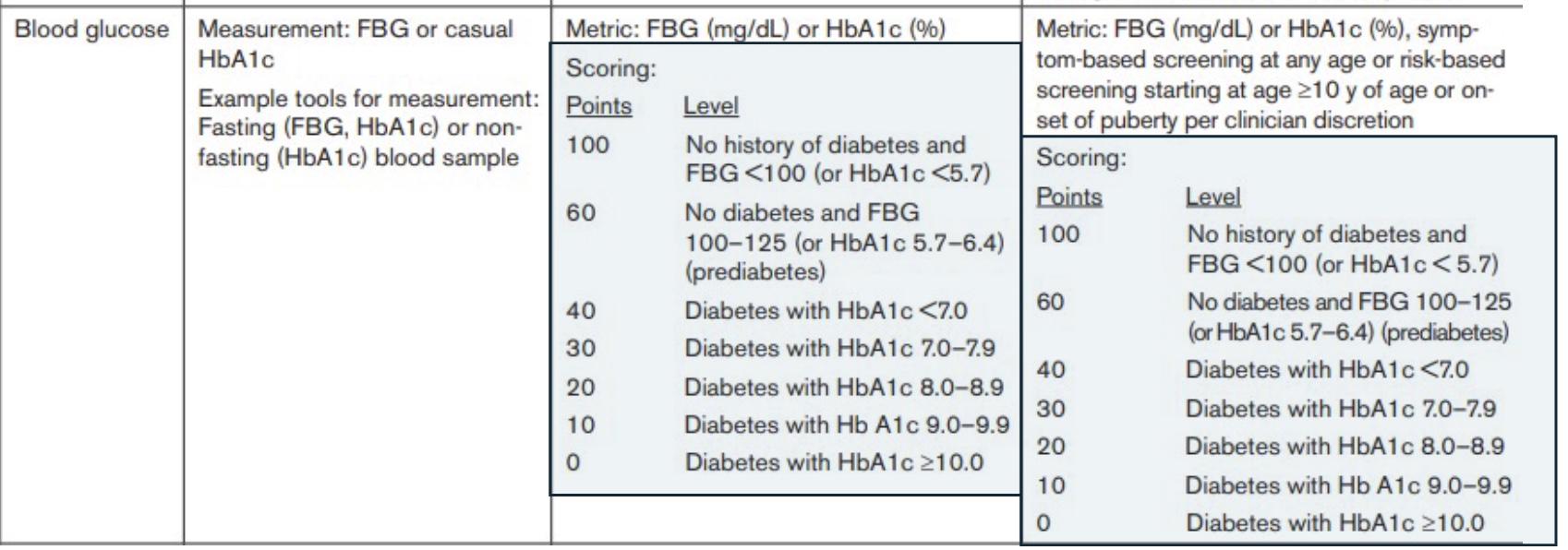
Life’s Essential 8: BP
